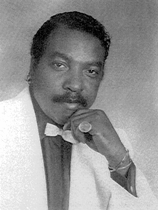Related Research Articles

The Brothers Johnson were an American funk and R&B band consisting of the American brothers George and Louis E. Johnson. They achieved their greatest success from the mid-1970s to early 1980s, with three singles topping the R&B charts.

Sam & Dave were an American soul and R&B duo who performed together from 1961 until 1981. The tenor (higher) voice was Sam Moore and the baritone/tenor (lower) voice was Dave Prater (1937–1988).

The Delfonics were an American R&B/soul vocal group from Philadelphia, Pennsylvania. The Delfonics were most popular in the late 1960s and early 1970s. Their most notable hits include "La-La ", "Didn't I ", "Break Your Promise", "I'm Sorry", and "Ready or Not Here I Come ". Their hit songs were primarily written by lead vocalist and founding member William "Poogie" Hart, and arranger and producer Thom Bell. Wilbert Hart is the last surviving member.

The Stylistics are an American, Philadelphia soul group that achieved their greatest chart success in the 1970s. They formed in 1968, with a lineup of singers Russell Thompkins Jr., Herb Murrell, Airrion Love, James Smith and James Dunn. All of their US hits were ballads characterized by the falsetto of Russell Thompkins Jr. and the production of Thom Bell. During the early 1970s, the group had twelve consecutive R&B top ten hits, including "Stop, Look, Listen", "You Are Everything", "Betcha by Golly, Wow", "I'm Stone in Love with You", "Break Up to Make Up" and "You Make Me Feel Brand New", which earned them 5 gold singles and 3 gold albums.
MFSB, officially standing for "Mother Father Sister Brother", was a pool of more than 30 studio musicians based at Philadelphia's Sigma Sound Studios. They worked closely with the production team of Gamble and Huff and producer/arranger Thom Bell, and backed up Harold Melvin & the Blue Notes, the O'Jays, the Stylistics, the Spinners, Wilson Pickett, and Billy Paul.

The Spinners are an American rhythm and blues vocal group that formed in Ferndale, Michigan, United States, in 1954. They enjoyed a string of hit singles and albums during the 1960s and 1970s, particularly with producer Thom Bell. The group continues to tour, with Henry Fambrough as the only original member.

"I Will Survive" is a song by American singer Gloria Gaynor, released in October 1978 as the second single from her sixth album, Love Tracks (1978). It was written by Freddie Perren and Dino Fekaris. A top-selling song, it is a popular disco anthem, as well as being certified Platinum by the Recording Industry Association of America (RIAA).

"You're All I Need to Get By" is a song recorded by the American R&B/soul duo Marvin Gaye and Tammi Terrell and released on Motown Records' Tamla label in 1968. It was the basis for the 1995 single "I'll Be There for You/You're All I Need to Get By" from Method Man and Mary J. Blige.
Blue Magic is an American R&B and soul group, and one of the more popular Philadelphia soul groups of the 1970s. Founded in 1972, the group's original members included lead singer Ted Mills with Vernon Sawyer, Wendell Sawyer, Keith Beaton, and Richard Pratt. Their most notable songs included smooth soul ballads such as "Sideshow", "Spell", "What’s Come Over Me", "Three Ring Circus", and "Stop to Start".
Vincent Montana Jr., known as Vince Montana, was an American composer, arranger, vibraphonist, and percussionist. He is best known as a member of MFSB and as the founder of the Salsoul Orchestra. He has been called "the Godfather of disco". Montana was inducted into the Musicians Hall of Fame and Museum in 2016.

"Didn't I (Blow Your Mind This Time)" is a song co-written by record producer Thom Bell and William Hart, lead singer of the American R&B/Soul vocal group the Delfonics. It was released by the group in 1969 on the Philly Groove record label and is regarded as a classic, winning a Grammy Award for Best R&B Vocal Performance by a Duo or Group.

"Hard to Say I'm Sorry" is a 1982 power ballad by the group Chicago. It was written by bassist Peter Cetera, who also sang the lead vocals on the track, and producer David Foster. It was released on May 17, 1982, as the lead single from the album Chicago 16. On September 11 it reached No. 1 for two weeks on the Billboard Hot 100. It was the group's second No. 1 single. It was their first top 50 hit since "No Tell Lover" in 1978 and it spent twelve weeks in the top 5 of the Billboard Hot 100. The single was nominated for a Grammy Award for Best Pop Performance by a Duo or Group with Vocal, and was certified gold by the Recording Industry Association of America (RIAA) in September of the same year. Songwriter Cetera, a member of the American Society of Composers, Authors and Publishers (ASCAP), won an ASCAP Pop Music Award for the song in the category, Most Performed Songs.
Walter "Bunny" Sigler was an American R&B singer, songwriter, multi-instrumentalist and record producer who did extensive work with the team of Kenny Gamble and Leon Huff, and was instrumental in creating the "Philly Sound" in the early 1970s.

Portfolio is the debut studio album by Grace Jones, released in 1977 by Island Records. It spawned her first big hit, "La Vie en rose".

"Old Time Rock and Roll" is a song written by George Jackson and Thomas E. Jones III, with uncredited lyrics by Bob Seger. It was recorded by Seger for his tenth studio album Stranger in Town. It was also released as a single in 1979. It is a sentimentalized look back at the music of the original rock 'n' roll era and has often been referenced as Seger's favorite song. The song gained renewed popularity after being featured in the 1983 film Risky Business. It has since become a standard in popular music and was ranked number two on the Amusement & Music Operators Association's survey of the Top 40 Jukebox Singles of All Time in 1996. It was also listed as one of the Songs of the Century in 2001 and ranked No. 100 in the American Film Institute's 100 Years...100 Songs poll in 2004 of the top songs in American cinema.
"I'm Sorry" is a 1960 hit song by 15-year-old American singer Brenda Lee. The song was written by Dub Allbritten and Ronnie Self. It peaked at No. 1 on the Billboard Hot 100 singles chart in July 1960. On the UK Singles Chart, the song peaked at No.12. AllMusic guide wrote that it is the pop star's "definitive song", and one of the "finest teen pop songs of its era".

"La-La " is an R&B/soul song by American vocal group the Delfonics. Released originally in December, 1967 by Philly Groove Records, the song was written by Thom Bell and William Hart, and produced by Bell and Stan Watson.

Major Harris III was an American R&B singer, associated with the Philadelphia soul sound and the Delfonics. His biggest hit as a solo artist was the 1975 single "Love Won't Let Me Wait".

"I'm in Love" is a 1981 single by singer Evelyn "Champagne" King. The single was a hit on three different music charts in the United States, hitting number one on both the Soul and dance charts and number 40 on the Billboard Hot 100. It was the first of two chart entries by King to reach number one on both the Soul and dance charts.
"With These Hands" is a song written by Benny Davis and Abner Silver and performed by Eddie Fisher featuring Hugo Winterhalter and His Orchestra. It reached number 7 on the U.S. pop chart in 1953.
References
- ↑ Whitburn, Joel (2004). Top R&B/Hip-Hop Singles: 1942-2004. Record Research. p. 153.
- ↑ "The Jonestown Death Tape (FBI No. Q 042)". Archive.org. 18 November 1978. Retrieved 15 July 2022– via Internet Archive.
- ↑ "Reversed Speech and Soul Music On Q 042 – Alternative Considerations of Jonestown & Peoples Temple". Jonestown.sdsu.edu. Retrieved 15 July 2022.